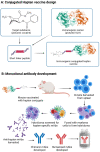Immunotherapies for the Treatment of Drug Addiction
- PMID: 36366287
- PMCID: PMC9697687
- DOI: 10.3390/vaccines10111778
Immunotherapies for the Treatment of Drug Addiction
Abstract
Substance use disorders (SUD) are a serious public health concern globally. Existing treatment platforms suffer from a lack of effectiveness. The development of immunotherapies against these substances of abuse for both prophylactic and therapeutic use has gained tremendous importance as an alternative and/or supplementary to existing therapies. Significant development has been made in this area over the last few decades. Herein, we highlight the vaccine and other biologics development strategies, preclinical, clinical updates along with challenges and future directions. Articles were searched in PubMed, ClinicalTrial.gov, and google electronic databases relevant to development, preclinical, clinical trials of nicotine, cocaine, methamphetamine, and opioid vaccines. Various new emerging vaccine development strategies for SUD were also identified through this search and discussed. A good number of vaccine candidates demonstrated promising results in preclinical and clinical phases and support the concept of developing a vaccine for SUD. However, there have been no ultimate success as yet, and there remain some challenges with a massive push to take more candidates to clinical trials for further evaluation to break the bottleneck.
Keywords: addiction; antigen delivery; immunotherapy; substance abuse; vaccine.
Conflict of interest statement
The authors declare no conflict of interest concerning the authorship and publication of this article.
Figures
References
-
- Merz F. United Nations Office on Drugs and Crime: World Drug Report 2017. SIRIUS—Z. Strateg. Anal. 2018;2:85–86.
-
- United Nations . World Drug Report 2019. United Nations; San Francisco, CA, USA: 2019.
-
- Ritchie H., Roser M. Drug Use. Our World in Data. 2019. [(accessed on 1 December 2019)]. Available online: https://ourworldindata.org/drug-use.
-
- National Institute on Drug Abuse (NIDA) Trends and Statistics. [(accessed on 1 June 2020)]; Available online: https://www.drugabuse.gov/drug-topics/trends-statistics.
Publication types
LinkOut - more resources
Full Text Sources



